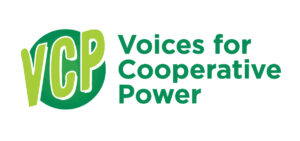By Barbara Nick and Kenric Scheevel
Friends and family have asked me why I came out of retirement from an Investor Owned Utility (IOU) to work at a G&T cooperative. I came to “Co-op Nation” because I am excited about the competitive advantage cooperatives have and wanted to put my leadership and experience to work and leverage that advantage for Dairyland and our members.
I told the Dairyland Power Board, “Cooperatives have a competitive advantage…cooperatives can do what IOUs either cannot or will not do.”
Since taking the helm at Dairyland, I am even more convinced that cooperatives have a definite advantage. But like most strengths, it is only one side of the coin.
It is critical for our success as cooperatives to leverage our inherent advantage – it is within our reach if we continue the rich traditions of Co-op Nation. This advantage is a matter of great pride for me as we celebrate Dairyland’s 75th anniversary in 2016, and recall the dedication and accomplishments of the Dairyland family. In fact our theme is: Living the Cooperative Advantage.
To fully appreciate the rich tradition and legacy of cooperatives, I turned to Dairyland Sr. Government Relations Representative Kenric Scheevel for additional perspective.
Kenric explained that for over 75 years, the Rural Electric Cooperative (REC) movement has epitomized the American spirit, demonstrating that by working together with a common purpose neighbors, communities and regions have the power to transform their world. RECs have turned obstacles into opportunities!
No other technological innovation has more profoundly changed daily life than the availability of safe, affordable and reliable electricity. Prior to 1935, life in rural America generally started at sunrise and ended at sunset – because nine out of ten rural homes had no electric service. While it was technically possible to deliver electricity to rural areas, it was not deemed profitable by the existing power companies. If rural America was to have access to electricity, rural residents would have to do it themselves—and they did just that!
President Roosevelt’s Rural Electrification program provided just the tools needed. Members of the newly formed rural electric cooperatives worked together to set poles and string wires. Soon the fledgling RECs determined they would further control their destiny by creating their own generation and transmission cooperatives. We are proud of the fact that our 1938 power plant was the first cooperative-built and owned generation in the nation. Today, nearly 1,000 locally owned cooperatives serve 75 percent of America’s land mass – providing power to 44 million people in 47 states. The electric grid has evolved from a simple set of poles and wires to what has been described as the most complex mechanism ever built by mankind.
It is clear that “Co-op Nation” has a rich history and heritage, and we must build on that foundation as we chart the course of our future. As Dairyland’s relatively new President and CEO, I wanted to share my thoughts on the competitive advantages inherent in the cooperative model.
The electric utility sector is facing unchartered challenges in the transition to a low-carbon future. In addition, the decline of energy usage per consumer and the rapid evolution of distributed energy resources will require us to leverage every advantage we have at our disposal.
The fact that our cooperative boards govern the business allows us to be flexible in meeting the needs of members and in making long-term decisions. We have certainty in creating a long-term financial and operational plan that is not subject to arbitrary changes.
I believe a strong cooperative governance model with informed and dedicated leadership on the board, and in executive management, is a linchpin to realizing our competitive advantage. Why do I say this? Because the success or failure of any endeavor is a reflection of its leadership. The Cooperative Principles provide a framework for making informed and member-driven decisions in a very complicated industry.
The other side of the coin is when there is a lack of effective leadership. When politics, ego or short-term thinking become primary decision drivers, then what was a competitive advantage becomes a weakness.
The real world examples of poor cooperative governance pale in comparison to the larger business world. We should take great pride in that and guard our ability to govern by continued attention to our duties of prudence, care and loyalty.
The REC’s non-profit structure and tax exempt status yields a lower cost of capital. Our members are both our customers and our owners, so we can focus on providing long-term value instead of having to maximize short-term shareholder profits. RECs are responsible to Main Street – not Wall Street.
The Rural Utility Service (RUS) loan program provides cooperatives access to low interest loans and the cost savings are passed along to members. Cooperatives are economic development engines. We invest in local rural communities by accessing grants and revolving loan funds. We help members reduce bills by employing energy efficiency so their business can grow.
Cooperatives recognize success is not a zero-sum game, but that everyone benefits when our members thrive. This is especially important since we serve predominately rural and often low-income members.
RECs benefit from an experienced and loyal workforce that is aligned with our mission of improving the lives of our members. Our heritage includes a “can do” attitude focused on serving the needs of our membership and being a part of the communities we serve. We display pride in making lives and communities better through the availability of safe, affordable, reliable and sustainable energy.
Strong relationships with all stakeholders are the cornerstone of the Cooperative Principles. Our employees are trusted as energy experts in their communities. Members look to their local cooperative for information and advice.
Members have a sense of belonging to something bigger than they are – especially in the area of political engagement. RECs represent 11 percent of the nation’s population, but play a big role in the political arena. Cooperatives are known and respected for their prowess in grassroots political action. When united with a purpose, Co-op Nation is powerful.
Co-op Nation has a rich and proud heritage that provides us with a tangible competitive advantage. We must honor that past as we embrace the future. This requires life-long learning and the application of sound principles of life and business.
We also recognize that to whom much has been given, much is required. We believe retaining our cooperative advantage is dependent upon adhering to a code of conduct that brings out our very best. In order to fully benefit from our competitive advantage, we should act consciously and with pride as we follow the Ten Cooperative Commandments.
Ten Cooperative Commandments
Do:
1. Live the seven Cooperative Principles every day.
2. Speak with respect. Listen with respect. Trust and be trustworthy.
3. Optimize our governance model with continuing education and high expectations.
4. Hire top talent and pay at market.

5. Focus on performance and long term value to members.
6. Embrace change – while honoring our history and traditions.
Do not:
7. Selectively live Cooperative Principles for personal convenience.
8. Allow ego, politics or personal gain to undermine sound business decisions.
9. “Be penny wise and pound foolish” when making business or financial decisions.
10. Settle for doing less than your absolute best every day.








